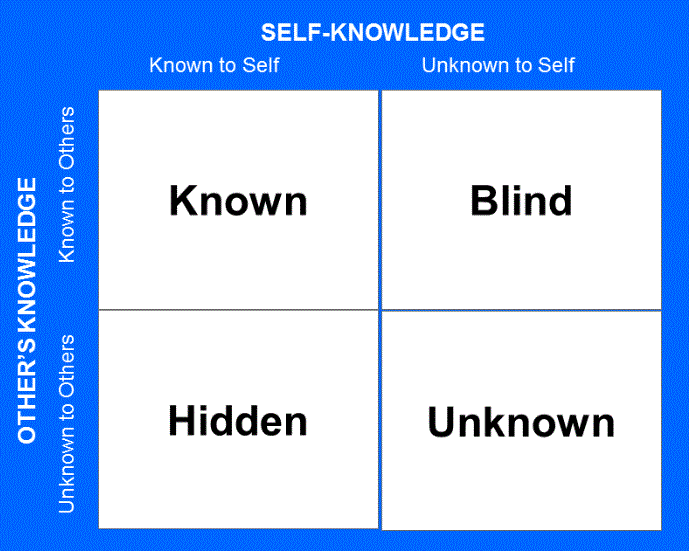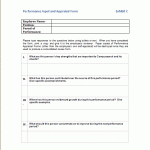Leaders of fast growing, early stage organizations operate at such a fast pace that often the last thing there is time to do is assess each member of the top team’s performance to determine how to prepare them for the next stage of evolution.
Most team members know each other pretty well. They have a good idea what each other is good at, has contributed, how they have grown, and what they should focus on next for success. However, team members rarely have the time, energy, training, or nerve to share what they know in a forthright, supportive conversation with one another.
 The way to improve Individual and team performance is to open their JoHari Window (click the figure above for more on the JoHari Window). Otherwise they are in the dark about what others know about them that, if they were known, would lead to improved performance.
The way to improve Individual and team performance is to open their JoHari Window (click the figure above for more on the JoHari Window). Otherwise they are in the dark about what others know about them that, if they were known, would lead to improved performance.
For example, it came to light during a professionally facilitated Executive Performance Assessment Process that the COO of a $15M, high-performance, and fast growing software firm made those reporting to him feel discounted when he turned to his phone during weekly one-on-one sessions. The team reviewed collected data and decided to let him know his behavior was off-putting and disempowering.
The COO was surprised by the feedback but made a commitment to behave differently. He asked for their assistance to help him change. All were supportive and even chuckled when he placed a sign on his desk during one-on-one sessions that said:
“Tell Me If I Am Being Disrespectful!”
The feedback worked in that his behavior changed. Soon the COO was promoted to CEO with the respect and admiration of his entire team now a $50M enterprise and heading to well over $100M soon!
A successful Performance Assessment Process collects input from each executive on the others to determine what each:
-
- Is good at
- Has contributed
- Has done to grow
- Should focus on next
Input is consolidated, peer-reviewed, and fine-tuned to crystallize the most important messages for each team member.
The best practice is for top teams to implement, internalize, and institutionalize an approach to the essential performance conversations in a way that is straightforward, easy, and routine. The approach is walked through in detail in this video clip (736):
The ideal approach guarantees that the team helps each member individually, and the team as a whole, achieve their full potential to perform and grow. The result is increased likelihood of successful transition to the next stage of organization evolution. The IntelliVen Executive Assessment Process (see data collection instrument above), in addition, recognizes that a different mix of competencies is key to organization success in each stage of organization evolution (Concept, Start up, Credible, Sustainable, and Mature). In each stage it is important for leaders to recognize how, who, and when an executive should be developed or a new executive brought on board.
The IntelliVen Executive Assessment Process (see data collection instrument above), in addition, recognizes that a different mix of competencies is key to organization success in each stage of organization evolution (Concept, Start up, Credible, Sustainable, and Mature). In each stage it is important for leaders to recognize how, who, and when an executive should be developed or a new executive brought on board.
Consequently, the ideal assessment process evolves by stage of organization maturity to help the top team identify holes so that they can decide to either groom or hire talent to fill upcoming needs.
For example, in a Start-up, executive skill in risk taking, execution, cash generation (i.e. sales and/or fund raising), and domain expertise are paramount. Strategic product management, operational excellence, and financial acumen are also important but not the same degree as execution competencies.
In the face of upcoming organization growth, the relative importance of key competencies changes to address what comes with organization maturity.
There is no perfect executive leader and no perfect executive team for all stages of evolution. However, a CEO and his/her Core Leadership Team can collectively achieve the needed combination of competency to increase the likelihood that their organization will succeed in the current stage of organization maturity.
IntelliVen helps organization leaders and their top teams fulfill their potential to perform and grow by implementing an Executive Assessment Process that efficiently guides fast moving, growing, early stage organizations to develop each team member, and of the top team as a whole, according to the venture’s evolutionary stage.
Reply to this post in confidence with your contact information to explore further how your organization can benefit from implementing an Executive Assessment Process.
Core points in this post were contributed by Reid Jackson, Dr. Dory Hollander, Dr. Ron Fell, Fred Nader, and Brent Green PhD.
